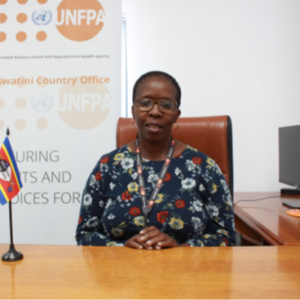Sanibonani bekunene,
On behalf of the United Nations Family in Eswatini and on behalf of the UN Resident Coordinator, Mr. George Wachira, who would have loved to be here with us, but unfortunately had to attend to other commitments, I am delighted to celebrate with you the International Day of Persons with Disabilities, under the theme, “United in action to rescue and achieve the SDGs For, With and by Persons with Disabilities.”
In 1992, the UN General Assembly proclaimed December 3 as the International Day of Persons with Disabilities to promote an understanding of disability issues and mobilize support for the dignity, rights, and well-being of Persons with Disabilities, worldwide.
In line with this year’s theme, the UN Secretary-General, Mr. Antonio Guterres has reminded us that achieving the Sustainable Development Goals requires living up to the promise to leave no one behind, especially the 1.3 billion persons with disabilities worldwide.
The UN Secretary-General has also underscored the importance of truly sustainable development for persons with disabilities, which focusses on their needs and rights — not only as beneficiaries, but as active contributors across social, economic, and political life.
Today, at the halfway point to the 2030 Agenda, persons with disabilities continue to face systemic discrimination and barriers that restrict their meaningful inclusion in all areas of society.
Persons with Disabilities represent 16% of the world's population, or 1 in 6 of us, yet they are among the most marginalized and vulnerable populations. A majority are uneducated, unemployed and the poor. Some die up to 20 years earlier than those without disabilities.
In 2017, the Eswatini Population and Housing Census estimated that there were 146 554 Persons with Disabilities in the Kingdom of Eswatini, representing 13% of the population. 7332 or 0.7% were persons with albinism.
Allow me to acknowledge and commend His Majesty’s Government for the important role it has played over the years, and continued to play today, in creating a conducive environment, including legal frameworks, that embraces the rights of persons with disabilities.
The availability of the Eswatini Constitution of 2005, ratification in 2012 of the UN Convention on the Rights of Persons with Disabilities, National Disability Policy of 2013, Eswatini National Disability Plan of Action of 2018 – 2022 which is currently being updated, Persons with Disability Act of 2018 are among the milestones to be celebrated by all stakeholders.
The Government of Eswatini’s commitment towards its compliance to the implementation of its obligations under the United Nations Convention on the Rights of Persons With Disabilities (UNCRPD), as evidence by the country’s submission of its combined initial, first and second periodic reports on the implementation of the UNCRPD to the Treaty Body Secretariat, which Eswatini submitted in December 2022, which reflected a positive picture on all the country’s achievements, challenges and future action points.
The on-going United Nations Partnership for the Rights of Persons with Disabilities Programme (UNPRPD) which the UN Family is implementing with the Deputy Prime Minister’s Office[BO1] seeks to support Government, Organizations of Persons with Disabilities and Civil Society Organizations in advancing the UNCRPD through:
-
- Strengthening disability inclusive Accountability and Governance,
- Advancement of Equality and Non-discrimination
- Ensuring UNCRPD-compliant Budgeting and Financial management approaches.
As a UN Family we acknowledge the numerous positive outcomes of the programme towards the full operationalization of the Persons with Disabilities Act of 2018.
Some of these positive outcomes include:
- The inauguration of the National Disability Advisory Council for Persons with Disabilities, which will provide the overall coordination of disability promotion, empowerment, mainstreaming, coordination, and evaluation of subsequent programme inputs, as appropriate.
- Numerous capacity building initiatives on disability mainstreaming and inclusive budgeting for various groups such as Government Disability Focal Points, Government Planners, National Disability Stakeholders, UN Results Groups, Civil Society including Organizations of Persons with Disabilities, to name but a few.
Ladies and Gentlemen, may I at this time take an opportunity to appreciate all the talents exhibited by Persons with Disabilities, here today. Your artistic expressions and performances have not only entertained us but have also sparked conversations about the importance of inclusivity and accessibility in all aspects of life. Your remarkable talent serves as a powerful reminder that inclusivity and equal opportunities can unlock incredible potential in every individual.
Hon. Deputy Prime Minister we acknowledge His Majesty’s Government leadership and support which have been instrumental in driving the necessary policy reforms and ensuring the allocation of resources needed to advance the rights of Persons with Disabilities.
We also extend our gratitude to all stakeholders, including those represented here today: Members of Parliament, Civil Servants, Organizations of Persons with Disabilities, Civil Society Groups, and individuals who have been advancing the cause for the rights and wellbeing of persons with disabilities. Your collaboration, expertise, and advocacy have played an invaluable role in fostering an inclusive society and advancing the disability agenda in the Kingdom of Eswatini.
Our collective challenge going forward is that we must ensure that persons with disabilities are at every decision-making table, in line with the Convention on the Rights of Persons with Disabilities, in our efforts to achieve the SDGs — from poverty eradication, to health, education and climate action.
Let me conclude with a call to action from the UN Secretary-General during this year’s commemoration.
He said:
“On this important day, I call on the world to work side-by-side with persons with disabilities to design and deliver solutions based on equal rights in every country and community.”
I thank you all for your attention.









